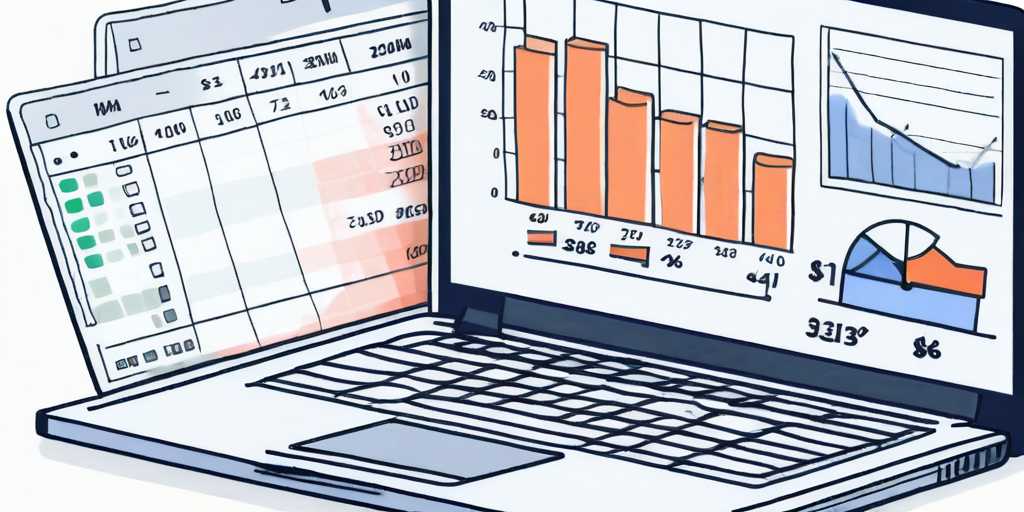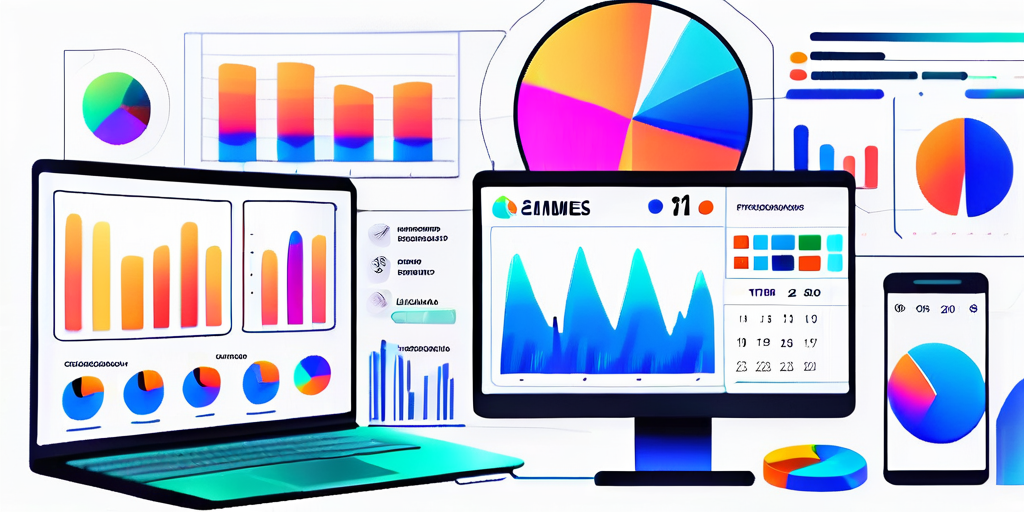
9 Tips To Better Manage Finances As a Freelancer [in 2024]
Managing finances as a freelancer can be challenging, but with the right strategies in place, it becomes easier to achieve financial stability and success.
In this article, we will explore nine essential tips to help you better manage your finances as a freelancer in 2024. From setting realistic financial goals to leveraging technology for financial tracking, these tips will empower you to take control of your financial future and thrive in your freelance career.
As a freelancer, I’ve found it incredibly useful to set specific savings goals each month. I start by defining my typical costs and revenues.
Then, month by month, I monitor my financial progress towards these goals. If I find that I’m ahead, it allows me the flexibility to invest more back into my business, potentially accelerating its growth.
On the other hand, if I’m not meeting my targets, I take it as a cue to evaluate and cut down on both personal and professional expenses. This methodical approach not only helps me stay on top of my finances in the short term but also ensures I’m building a stable financial base for the future.
Now, let’s explore all the steps in more detail.
1. Setting Realistic Financial Goals
Setting realistic financial goals is crucial for any freelancer. It provides a clear direction and motivates you to work towards achieving those goals. Start by assessing your current financial situation and identifying specific objectives you want to accomplish.
Whether it’s saving for a new house, paying off debts, or building an emergency fund, setting realistic goals will help you stay focused and motivated.
To effectively manage your finances, break down your goals into smaller, actionable steps. This way, you can track your progress and celebrate each milestone you achieve. Remember, the key is to set goals that are attainable and align with your long-term vision.
Furthermore, it’s essential to regularly review and adjust your financial goals as your circumstances change. Life is dynamic, and so are your financial needs and priorities. By periodically reassessing your goals, you can ensure that they remain relevant and achievable.
Another important aspect of setting financial goals is to consider both short-term and long-term objectives. While it’s crucial to focus on immediate financial needs, such as paying off debts or building an emergency fund, don’t forget to plan for the future. Investing in retirement savings or creating a college fund for your children are examples of long-term financial goals that require consistent planning and dedication.
2. Understanding Your Income Streams
As a freelancer, your income may fluctuate irregularly. It’s essential to have a clear understanding of your income streams to effectively manage your finances. Identify the sources that generate revenue and assess their consistency and reliability. This will help you anticipate income fluctuations and plan your budget accordingly.
If you rely on multiple clients or projects for income, consider diversifying your client base to minimize the risks associated with relying on a single source. Additionally, keep track of your expenses and ensure they align with your income streams. By understanding your income sources and managing your expenses, you can maintain financial stability and avoid unnecessary financial stress.
Furthermore, it’s crucial to set financial goals based on your income streams. Whether you aim to save a certain amount each month, invest in professional development, or allocate funds for future business expansion, having clear financial objectives can guide your decision-making and help you stay focused on your long-term financial success.
Another aspect to consider when analyzing your income streams is the seasonality of your work. Some freelancers experience peak seasons where they earn significantly more, while others may face slower periods. Understanding these patterns can help you better prepare for lean months by setting aside funds during high-earning periods or seeking additional income opportunities during slower times.
3. Creating a Detailed Budget Plan
A detailed budget plan is essential for freelancers to manage their finances effectively. Start by analyzing your monthly income and expenses. Categorize your expenses into fixed (rent, utilities) and variable (groceries, entertainment) expenses. This will give you a clear picture of where your money is going and help identify areas where you can make adjustments.

Consider using budgeting apps or spreadsheets to track your budget and expenses. Set realistic spending limits and prioritize your essential expenses. Additionally, allocate a portion of your income towards savings and investments. By creating a detailed budget plan and sticking to it, you can better manage your finances and achieve your financial goals.
When creating your budget plan, it’s important to account for irregular expenses such as annual subscriptions, maintenance costs, or unexpected emergencies. By setting aside a small amount each month for these irregular expenses, you can avoid financial strain when they arise. It’s also beneficial to review and adjust your budget regularly to reflect any changes in your income or expenses.
Another helpful tip is to consider creating separate budget categories for personal and business expenses if you’re a freelancer. This can help you track your business-related costs more efficiently and ensure that you’re not mixing personal and business finances. By maintaining clear distinctions between the two, you can better monitor your cash flow and make informed financial decisions.
4. Leveraging Technology for Financial Tracking
Technology can be a game-changer when it comes to managing your finances as a freelancer. Numerous financial apps and software can help you track your income, expenses, and savings effortlessly. Automate processes like tracking expenses, generating invoices, and monitoring your cash flow.

By leveraging technology, you can save time, reduce human error, and gain valuable insights into your financial health. Embrace digital tools that offer features like automatic expense categorization, notifications for due payments, and real-time financial reporting. This way, you can stay organized, make informed financial decisions, and focus more on growing your freelance business.
Furthermore, integrating your financial tracking tools with cloud storage services can provide added security and accessibility to your financial data. This ensures that your financial information is securely backed up and easily accessible from anywhere, allowing you to manage your finances on the go without worrying about data loss.
Additionally, consider exploring tools that offer budgeting features to help you set financial goals, track your progress, and adjust your spending habits accordingly. With the ability to visualize your financial data through interactive charts and graphs, you can gain a deeper understanding of your financial patterns and make strategic decisions to improve your financial stability in the long run.
5. Building an Emergency Fund for Stability
As a freelancer, unexpected bumps in the road can have a significant impact on your finances. Building an emergency fund is crucial to ensure financial stability during unforeseen circumstances. Aim to save at least three to six months’ worth of living expenses in an easily accessible and separate account.
Start by setting aside a fixed amount from each payment you receive. Treat your emergency fund as a non-negotiable expense, prioritizing it just like your other essential bills. Having an emergency fund will give you peace of mind and the flexibility to navigate challenges without relying on credit or loans.
Consider automating your savings by setting up recurring transfers to your emergency fund account. This way, you won’t even have to think about it, and the money will steadily grow over time. Additionally, periodically review your budget to see if you can increase the amount you’re putting into your emergency fund as your income allows.
Another strategy to boost your emergency fund is to look for ways to increase your income. This could involve taking on extra freelance projects, selling items you no longer need, or exploring passive income streams. By diversifying your income sources, you can accelerate your emergency fund growth and enhance your financial security.
6. Negotiating Rates and Contracts Effectively
Freelancers often face the challenge of negotiating rates and contracts with clients. It’s essential to value your skills and expertise and ensure you are compensated fairly for your work. Research industry standards and compare rates to make informed decisions when negotiating.
When negotiating contracts, clearly define project scope, deadlines, and payment terms. Be confident in discussing your rates and justifying your value. Remember, setting fair prices and establishing clear agreements will not only benefit you financially but also foster healthy and long-term client relationships.
One effective strategy in negotiating rates is to emphasize the unique value you bring to the table. Highlight your experience, specialized skills, and track record of successful projects. By showcasing what sets you apart from others in your field, you can justify charging higher rates for your services.
Additionally, it’s important to consider the long-term implications of the contracts you agree to. Look beyond just the immediate financial gain and evaluate how each project aligns with your career goals and values. Building a portfolio of high-quality work that you are proud of can lead to more opportunities and referrals in the future.
7. Investing for Long-Term Financial Growth
Investing is crucial for long-term financial growth and security. As a freelancer, you may not have access to traditional employer-sponsored retirement plans. However, there are several investment options you can explore to build wealth over time.

Consider opening a self-employed retirement account, such as a Simplified Employee Pension Individual Retirement Account (SEP-IRA) or a Solo 401(k). These accounts allow you to contribute a portion of your freelance income towards retirement savings, potentially offering tax advantages.
Additionally, educate yourself about other investment opportunities like stocks, bonds, or real estate. Consult a financial advisor to determine which investment options align with your risk tolerance and long-term goals. By investing strategically, you can secure your financial future and enjoy the benefits of compound interest.
Furthermore, diversification is a key strategy in long-term investing. By spreading your investments across different asset classes, you can reduce risk and potentially increase returns. For example, investing in a mix of stocks, bonds, and real estate can help you weather market fluctuations and economic downturns.
Another important aspect to consider is the power of consistent contributions. Setting up automatic contributions to your investment accounts can help you stay disciplined and take advantage of dollar-cost averaging. This strategy involves investing a fixed amount of money at regular intervals, regardless of market conditions, which can lower the average cost per share over time.
8. Balancing Work and Personal Finances
Managing finances as a freelancer involves finding a balance between your work and personal life. Separating your business and personal finances is essential for accurate tracking and tax purposes. Set up separate bank accounts and use accounting software to keep your business and personal expenses separate.
Furthermore, prioritize self-care and ensure you allocate time for personal activities and leisure. Remember, freelancing is not just about financial success; it’s also about enjoying the freedom and flexibility it offers. By finding equilibrium between work and personal life, you can achieve financial stability while maintaining overall well-being.
When it comes to budgeting as a freelancer, it’s important to consider both short-term and long-term financial goals. Create a budget that accounts for irregular income streams and plan for any fluctuations in your earnings. Setting aside emergency funds for unexpected expenses can provide a safety net during lean months.
Additionally, explore different investment options to grow your wealth over time. Consider consulting with a financial advisor to develop a personalized investment strategy that aligns with your financial goals and risk tolerance. Diversifying your investment portfolio can help mitigate risks and maximize returns in the long run.
9. Take Advantage of Automatization to Reduce Costs
Automating your finances is an effective way to reduce costs and streamline your financial management. Set up automatic bill payments to avoid late fees or missed payments. Explore options for automatic saving transfers, ensuring a portion of your income goes directly into your savings or investment accounts.
Additionally, review your subscriptions and recurring expenses regularly. Cancel unnecessary subscriptions and negotiate better rates for essential services. By taking advantage of automatization, you can simplify your financial tasks, save time, and optimize your expenses.
Automatization is not just limited to bill payments and saving transfers. You can also automate your investment strategy through robo-advisors, which use algorithms to manage your investments based on your financial goals and risk tolerance. This hands-off approach can help you diversify your portfolio and potentially maximize your returns over time.
Moreover, consider automating your budgeting process by using apps that track your spending, categorize expenses, and provide insights into your financial habits. By having a clear overview of where your money is going, you can identify areas where you can cut back and allocate more funds towards your financial goals.
In conclusion, managing finances as a freelancer requires a proactive and strategic approach. By setting realistic financial goals, understanding your income streams, and creating a detailed budget plan, you lay the foundation for financial success. Leveraging technology for financial tracking, building an emergency fund, and negotiating rates effectively further empower you to manage your finances proficiently.
Investing for long-term growth, balancing work and personal finances, and utilizing automation to reduce costs are additional ways freelancers can navigate their financial journey successfully. By implementing these nine tips, you can better manage your finances as a freelancer in 2024 and beyond, achieving stability, growth, and peace of mind.

